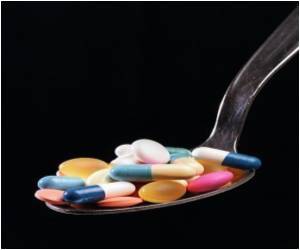
The invention by Marek Romanowski, an associate professor of biomedical engineering in the UA College of Engineering and a member of the BIO5 Institute and the Arizona Cancer Center, and his lab team doesn't have a silver lining. Better: It has a lining of gold. The secret to non-invasively controlling the release of chemotherapeutic drugs lies in nano-scale capsules made of lipids and coated with a fine layer of gold.
Chemotherapeutic drugs are sometimes encased in small capsules called liposomes, which are made of organic lipids that are already present in human cells. The lipid encasing keeps the body's immune system from attacking the foreign molecule before it can deliver the drug.
Once released into the bloodstream, drug-carrying liposomes accumulate around a cancer tumor because of a property known as leaky vasculature: Tumor cells have extra openings to blood vessels to take in nutrients carried in the bloodstream, usually because they are trying to grow more quickly than normal cells. The extra blood flow means that more nutrients, and also more liposomes, are likely to accumulate in the tumor cells where they eventually break down and release the drug into the cells, leading to cell death.
The highly toxic drugs used for chemotherapy destroy cancer cells, but with no way to discriminate between cell types, they can also damage healthy cells. This damage to the body's normal, healthy cells leads to the side effects normally associated with chemotherapy treatments: anemia, hair loss, vomiting - as cells that make up stomach lining are destroyed - and nausea, among others.
To better target cancer cells, the UA team attached liposomes to signal molecules called ligands, which interact with specific cell receptors like keys in a lock.
Advertisement
The extra receptors make the liposomes more likely to latch onto and get inside tumor cells than normal cells.
Advertisement
The new invention could allow doctors to control the amount of drug released at a time, and to release the drug only in the tumor region, thereby protecting healthy cells from damage caused by the drug. This is where the gold lining comes in.
"A property of gold is that it can convert near infrared light into heat," said Kachur.
"By putting gold on the surface of these liposomes, we can then put in a stimulus such as near-infrared light. The gold converts the light into heat, the heat causes the liposome to become leaky, and then whatever's really concentrated inside can diffuse out through the leaky liposome."
"Infrared light penetrates the deepest through the body because it interacts the least with most tissues, and it also prevents a lot of the heating that your body might [otherwise] experience," said Kachur.
Source-ANI














